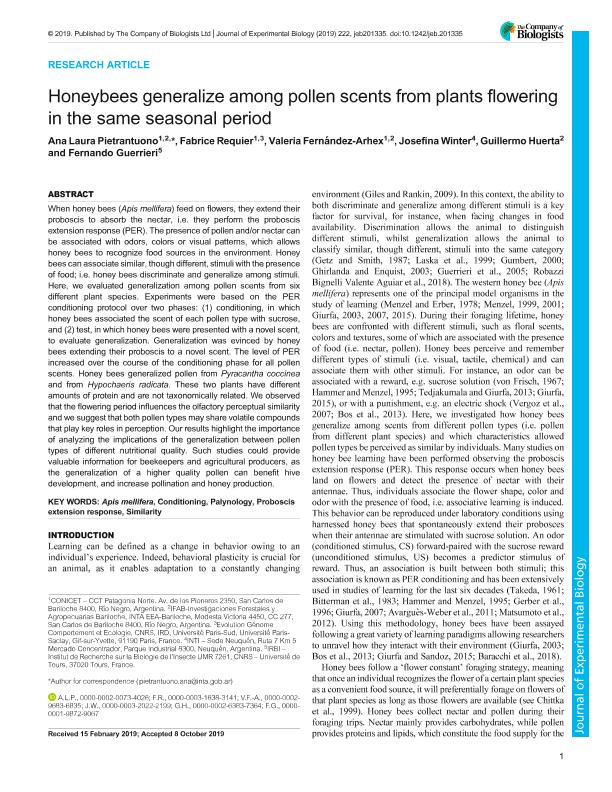Mostrar el registro sencillo del ítem
dc.contributor.author
Pietrantuono, Ana Laura

dc.contributor.author
Requier, Fabrice

dc.contributor.author
Fernandez Arhex, Valeria Cristina

dc.contributor.author
Winter, Josefina
dc.contributor.author
Huerta, Guillermo
dc.contributor.author
Guerrieri, Fernando Javier

dc.date.available
2020-08-12T17:56:17Z
dc.date.issued
2019-10
dc.identifier.citation
Pietrantuono, Ana Laura; Requier, Fabrice; Fernandez Arhex, Valeria Cristina; Winter, Josefina; Huerta, Guillermo; et al.; Honeybees generalize among pollen scents from plants flowering in the same seasonal period; Company of Biologists; Journal of Experimental Biology; 10-2019
dc.identifier.issn
0022-0949
dc.identifier.uri
http://hdl.handle.net/11336/111577
dc.description.abstract
When honey bees (Apis mellifera)feed on flowers they extend their proboscis to absorb the nectar, i.e. they perform the proboscisextension response (PER). The presence of pollen and/or nectar can beassociated with odors, colors or visual patterns, which allows the bee torecognize food sources in the environment. Bees can associate similar, thoughdifferent, stimuli with the presence of food; i.e. bees discriminate and generalize among stimuli. Here, we evaluated generalization among pollen scents from six different plantspecies. Experiments were based on the PER conditioning protocol over twophases: (1) Conditioning, in whichbees associated the scent of each pollen type with sucrose, and (2) Test, in which bees were presented witha novel scent, to evaluate generalization. Generalization was evinced by beesextending their proboscis to a novel scent. The level of PER increased over thecourse of the conditioning phase for all pollen scents. Bees generalizedpollenfrom Pyracantha coccinea and from Hypochaeris radicata. These two plants havedifferent amountsamount of protein and are not taxonomically related. WeW suggest that both pollen types may share volatile compoundsthat play key roles in perception similarity. Our results highlight theimportance of analyzing the implications of the generalization betweenpollen types of different nutritional quality, since it could provide valuableinformation for beekeeping and agricultural producers (generalization of apollen of lower quality towards one of higher quality can benefit thedevelopment of the hive, increase pollination or honey production). Besides, weobserved that not only chemical features but also temporality are parametersdefining olfactory similarity.
dc.format
application/pdf
dc.language.iso
eng
dc.publisher
Company of Biologists

dc.rights
info:eu-repo/semantics/openAccess
dc.rights.uri
https://creativecommons.org/licenses/by-nc-sa/2.5/ar/
dc.subject
APIS MELLIFERA
dc.subject
CONDITIONING
dc.subject
PALINOLOGY
dc.subject
PROBOSCIS EXENSION RESPONSE
dc.subject
SIMILARITY
dc.subject.classification
Zoología, Ornitología, Entomología, Etología

dc.subject.classification
Ciencias Biológicas

dc.subject.classification
CIENCIAS NATURALES Y EXACTAS

dc.title
Honeybees generalize among pollen scents from plants flowering in the same seasonal period
dc.type
info:eu-repo/semantics/article
dc.type
info:ar-repo/semantics/artículo
dc.type
info:eu-repo/semantics/publishedVersion
dc.date.updated
2020-06-30T17:56:14Z
dc.journal.pais
Reino Unido

dc.journal.ciudad
Cambridge
dc.description.fil
Fil: Pietrantuono, Ana Laura. Instituto Nacional de Tecnología Agropecuaria. Centro Regional Patagonia Norte. Estación Experimental Agropecuaria San Carlos de Bariloche. Instituto de Investigaciones Forestales y Agropecuarias Bariloche. - Consejo Nacional de Investigaciones Científicas y Técnicas. Centro Científico Tecnológico Conicet - Patagonia Norte. Instituto de Investigaciones Forestales y Agropecuarias Bariloche; Argentina
dc.description.fil
Fil: Requier, Fabrice. Université Paris Sud; Francia
dc.description.fil
Fil: Fernandez Arhex, Valeria Cristina. Instituto Nacional de Tecnología Agropecuaria. Centro Regional Patagonia Norte. Estación Experimental Agropecuaria San Carlos de Bariloche. Instituto de Investigaciones Forestales y Agropecuarias Bariloche. - Consejo Nacional de Investigaciones Científicas y Técnicas. Centro Científico Tecnológico Conicet - Patagonia Norte. Instituto de Investigaciones Forestales y Agropecuarias Bariloche; Argentina
dc.description.fil
Fil: Winter, Josefina. Instituto Nacional de Tecnología Industrial; Argentina
dc.description.fil
Fil: Huerta, Guillermo. Instituto Nacional de Tecnología Agropecuaria. Centro Regional Patagonia Norte. Estación Experimental Agropecuaria San Carlos de Bariloche; Argentina
dc.description.fil
Fil: Guerrieri, Fernando Javier. Universite de Tours; Francia
dc.journal.title
Journal of Experimental Biology

dc.relation.alternativeid
info:eu-repo/semantics/altIdentifier/url/http://jeb.biologists.org/lookup/doi/10.1242/jeb.201335
dc.relation.alternativeid
info:eu-repo/semantics/altIdentifier/doi/http://dx.doi.org/10.1242/jeb.201335
Archivos asociados
